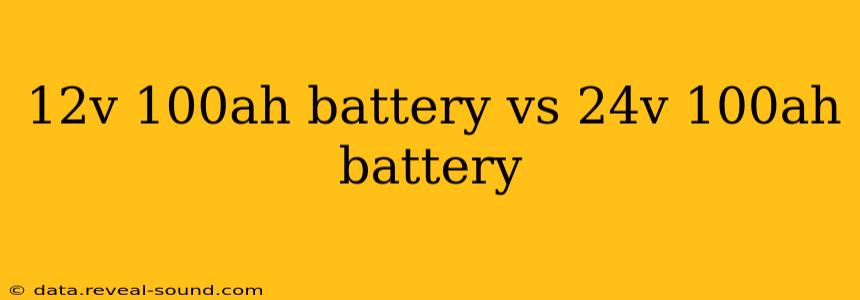Choosing between a 12V 100Ah battery and a 24V 100Ah battery depends entirely on your application. While both offer the same amp-hour (Ah) rating, indicating the same charge capacity, the voltage difference significantly impacts their power delivery and suitability for various purposes. This article will delve into the core distinctions, helping you make an informed decision.
What Does 12V and 24V Mean?
The voltage (V) represents the electrical potential difference between the battery's terminals. A higher voltage means a greater push of electrons, resulting in more power. A 24V battery delivers twice the voltage of a 12V battery.
What Does 100Ah Mean?
The amp-hour (Ah) rating signifies the battery's capacity to supply current over time. A 100Ah battery can theoretically provide 100 amps for one hour, 10 amps for 10 hours, or any combination thereof. Both the 12V and 24V batteries in this comparison have the same capacity in terms of Ah.
Power Output: The Crucial Difference
While both batteries possess the same Ah rating, their power output differs significantly. Power (measured in watts) is calculated by multiplying voltage (V) by current (A): Power (Watts) = Voltage (Volts) x Current (Amps).
A 24V 100Ah battery can deliver significantly more power than a 12V 100Ah battery for the same current draw. This is because the higher voltage allows more work to be done with the same amount of charge.
Applications: Where Each Battery Shines
The choice between a 12V and 24V battery often comes down to the power requirements of your devices.
12V 100Ah Battery Applications:
- Cars: Most standard vehicles operate on a 12V system.
- Small-scale off-grid power systems: Suitable for powering low-wattage appliances and devices.
- Recreational vehicles (RVs) and boats (with appropriate inverters): Often used as auxiliary power sources.
- Uninterruptible power supplies (UPS): For smaller systems protecting sensitive equipment.
24V 100Ah Battery Applications:
- Larger off-grid solar systems: More efficient for higher-wattage appliances and systems requiring more power.
- Electric vehicles (EVs) and golf carts: Many larger electric vehicles utilize 24V or higher systems.
- Industrial equipment: Various industrial machinery operates on 24V systems.
- High-power lighting systems: Suitable for applications requiring more intense and sustained illumination.
How Much Power Can Each Battery Provide?
This depends on the load. Let's assume a consistent 10-amp draw:
- 12V 100Ah battery: 12V * 10A = 120W
- 24V 100Ah battery: 24V * 10A = 240W
This illustrates the clear power advantage of the 24V system.
Which Battery is More Efficient?
Generally, higher-voltage systems, like the 24V system, can be more efficient in some applications, particularly when using thinner gauge wires. This is because the same amount of power can be transmitted with less current at higher voltage, minimizing energy loss from resistance in the wiring. However, the efficiency gains are often dependent on the overall system design and load.
Cost Considerations
The cost difference between a 12V 100Ah battery and a 24V 100Ah battery can vary significantly depending on the manufacturer, technology (lead-acid, lithium-ion, etc.), and specific features. There is not a universally consistent price difference.
Conclusion
The "better" battery (12V 100Ah vs. 24V 100Ah) entirely depends on your needs. Consider the voltage requirements of your devices and the overall power demands of your system. A 24V battery offers higher power output, potentially greater efficiency, but may require different compatible devices and equipment. A 12V battery is more common and suitable for numerous lower-power applications. Carefully assess your specific needs before making a purchase.
